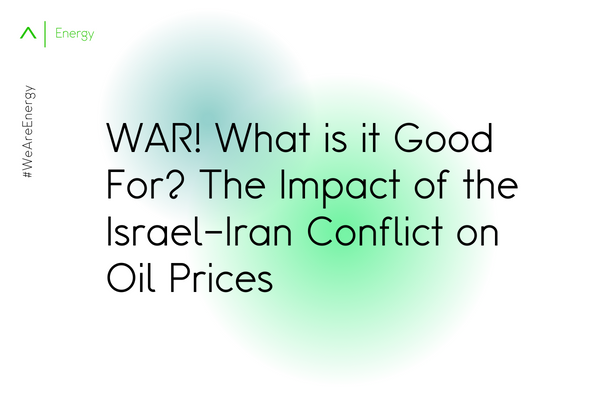WAR! What is it Good For? The Impact of the Israel-Iran Conflict on Oil Prices
02 May, 20242 minsThe world watched with bated breath in April 2024 as tensions between Israel and Iran escala...

The world watched with bated breath in April 2024 as tensions between Israel and Iran escalated into unprecedented direct attacks. Iran launched a barrage of over 300 drones and missiles at Israel, marking the first time it has directly struck Israeli territory. Israel responded with limited airstrikes of its own. While a full-scale war was averted for now, the conflict sent ripples through global oil markets.
Iran is the third largest producer in OPEC, pumping out over 3 million barrels per day. Any disruption to its oil exports could have major ramifications on prices. There are also fears Iran could attempt to choke off the critical Strait of Hormuz between the Persian Gulf and Gulf of Oman, through which about a fifth of the world's oil passes each day.
When the Iranian attack occurred, oil prices initially spiked nearly 2% to around $88 per barrel for Brent crude. However, prices quickly retreated after Iranian state media played down the significance of Israel's retaliatory strikes. Still, analysts warn that any further escalation could easily push oil to $100 per barrel or higher.
"If we have an unpredicted supply disruption say, Libyan supply is cut or Russian port infrastructure is droned by Ukraine, prices could definitely spiral out of control again, towards $100/bbl," said Kpler analyst Viktor Katona.
The fragile geopolitical situation has prompted several major banks to raise their oil price forecasts for the near term. Citi hiked its short-term projection from $80 to $88 per barrel, while still cautioning that prices are not yet baking in a continuation of all-out conflict. Société Générale now sees Brent averaging nearly $87 for 2024 as a whole.
For businesses, surging crude costs could squeeze already thin margins. Transportation companies face higher fuel expenses, while manufacturers grapple with pricier raw materials and rising shipping costs. Industries with energy-intensive production, such as chemicals, metals, and cement, are particularly vulnerable. Small businesses may struggle to absorb the added costs, putting their survival at risk.
An oil shock would also pose a major headache for central banks as they grapple with when to start easing interest rates. Higher energy prices could keep inflation stubbornly elevated, delaying the long-awaited pivot. This prolongs the pain for companies and consumers alike.
The commercial impacts go beyond just the direct hit from costlier crude. Conflict in the Middle East generates huge uncertainty, causing businesses to put expansion and investment plans on ice. The prospect of a wider war, even if unlikely, makes executives hesitant to commit capital. Global trade could also take a hit if key chokepoints like the Strait of Hormuz see disruptions.
The Israel-Iran standoff may have stabilised for now, but it highlights the many pressure points that could disrupt energy markets - from the war in Ukraine to rebels near the Suez Canal to China-Taiwan friction. In this environment, companies need to brace for a world where sudden spikes in operating costs become an unfortunate fact of life. Building resilience and flexibility into business models is crucial.
While cheap, abundant oil powered the global economy for decades, businesses now face a future defined by energy insecurity. Careful planning and nimble adaptation will be key to navigating the bumpy road ahead. In a world where geopolitical risk is the norm rather than the exception, only the most agile companies will thrive in the face of oil's wild gyrations. The ability to weather the crude storm has become a defining competitive advantage.
The escalating tensions between Israel and Iran and the resulting impact on oil prices could have significant implications for hiring within the UK's oil and gas industry. Here's how the situation might affect employment in this sector:
1. Increased demand for North Sea oil and gas: If the conflict in the Middle East disrupts global oil supply, there could be a surge in demand for UK North Sea oil and gas as a more stable alternative. This could lead to increased hiring for roles in exploration, production, and support services as companies ramp up operations to meet the growing demand.
2. Focus on efficiency and automation: With the potential for higher oil prices, companies in the UK oil and gas industry may prioritise efficiency and cost-saving measures. This could involve investing in automation technologies and streamlining processes, which might lead to a shift in the types of roles being hired. There could be an increased demand for professionals with expertise in data analytics, artificial intelligence, and robotics to support these initiatives.
3. Emphasis on risk management and contingency planning: The geopolitical uncertainty surrounding the Israel-Iran conflict may prompt UK oil and gas companies to place a greater emphasis on risk management and contingency planning. This could lead to increased hiring for roles in risk assessment, strategic planning, and crisis management to help companies navigate the challenging market conditions.
4. Potential for project delays and cancellations: If the conflict escalates and oil prices become highly volatile, some UK oil and gas companies may choose to delay or cancel planned projects due to the increased financial risk. This could result in a temporary slowdown in hiring for certain roles, particularly those related to new exploration and development initiatives.
5. Shift towards energy transition roles: The oil price shock could accelerate the UK's transition towards cleaner energy sources and sustainable practices. As a result, there may be an increased demand for professionals with expertise in renewable energy, carbon capture and storage, and energy efficiency solutions. Oil and gas companies may also seek to hire individuals with transferable skills who can support their diversification efforts into low-carbon technologies.
6. Emphasis on international experience: With the global nature of the oil and gas industry, UK companies may place a higher value on candidates with international experience, particularly those with expertise in navigating geopolitical risks and supply chain disruptions. Professionals who have worked in regions affected by conflict or have experience in crisis management could be in high demand.
7. Focus on employee retention: In a challenging and uncertain market, UK oil and gas companies may prioritise retaining their existing skilled workforce to maintain stability and competitiveness. This could involve offering attractive compensation packages, career development opportunities, and employee support programmes to keep top talent engaged and motivated.
In summary, the impact of the Israel-Iran conflict on oil prices could lead to a mix of increased demand for UK North Sea oil and gas, a focus on efficiency and automation, and a shift towards energy transition roles. However, the exact consequences will depend on the severity and duration of the conflict, as well as the resilience and adaptability of individual companies within the UK oil and gas industry. Organisations that can demonstrate agility, innovation, and a commitment to employee well-being may have an advantage in attracting and retaining the talent needed to navigate the challenging market conditions.


